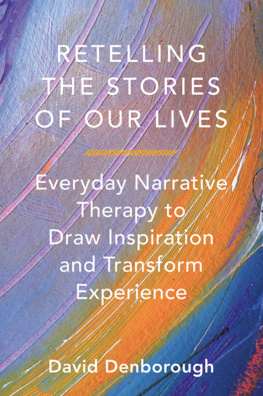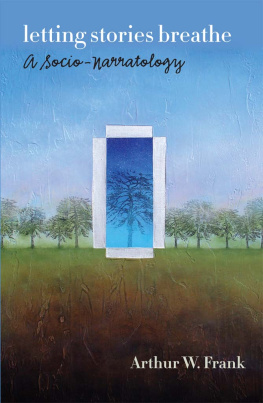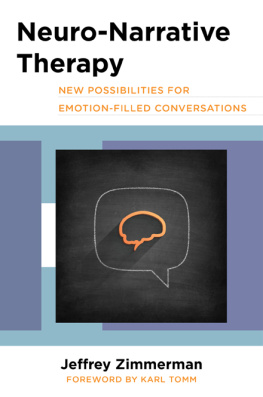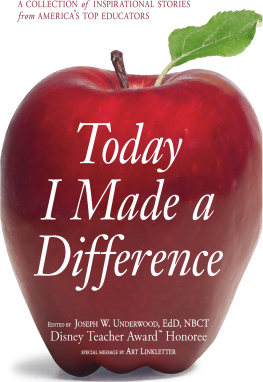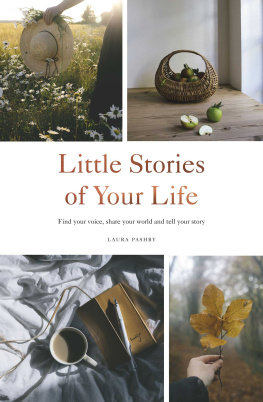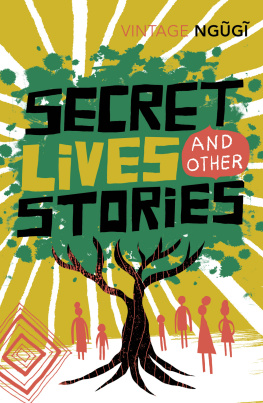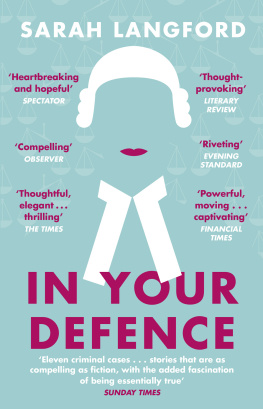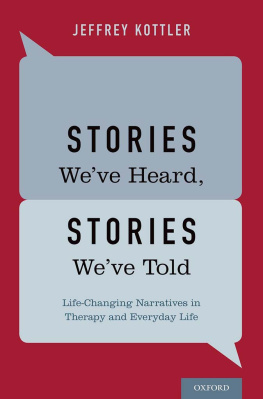
Retelling
the
Stories
of
Our Lives
Everyday Narrative Therapy to
Draw Inspiration and
Transform Experience
David Denborough

W. W. Norton & Company
New York London
Copyright 2014 by David Denborough
All rights reserved.
Printed in the United States of America
First Edition
For information about permission to reproduce selections from this book, write to Permissions, W. W. Norton & Company, Inc. 500 Fifth Avenue, New York, NY 10110
For permission about special discounts for bulk purchases, please contact W. W. Norton Special Sales at or 800-233-4830
Manufacturing by Quad Graphics Fairfield
Design by MidAtlantic Publishing Services
Production manager: Leeann Graham
Library of Congress Cataloging-in-Publication Data
Denborough, David.
Retelling the stories of our lives : everyday narrative therapy to draw inspiration and transform experience / David Denborough. First edition.
pages cm
A Norton Professional Book.
Includes bibliographical references and index.
ISBN 978-0-393-70815-8 (pbk.)
1. Narrative therapy. I. Title.
RC489.S74D46 2014
616.89165dc23
2013031460
ISBN:978-0-393-70815-8 (pbk.)
ISBN:978-0-393-70913-1 (e-book)
W. W. Norton & Company, Inc., 500 Fifth Avenue, New York, N.Y. 10110
www.wwnorton.com
W. W. Norton & Company Ltd., Castle House, 75/76 Wells Street, London W1T 3QT
Dear Reader,
Our lives and their pathways are not fixed in stone; instead they are shaped by story. The ways in which we understand and share the stories of our lives therefore make all the difference. If we tell stories that emphasize only desolation, then we become weaker. Alternatively, we can tell our stories in ways that make us stronger, in ways that soothe the losses, in ways that ease sorrow.
In the pages that follow, I will share stories with you from different parts of the worldfrom individuals, groups, and communities who are rewriting the stories of their lives. And I will ask you questions about the stories of your lifeabout the central characters, the plots, the key scenes, even the soundtrack.
I am interested in why you have picked up this book. Perhaps you are going through hard times or long for something to be different in life, or perhaps you have a friend or family member whom you dearly want to help. I dont know the stories of your life. I do know, however, that with the right questions and the right audience, the stories of our lives can be transformed.
When our lives have been more tragedy than triumph, too often this is because other people have written the stories that influence our lives, or because broader powers such as sexism, violence, racism, or poverty have become the authors of the storylines of our identity. This is a book about revising these life stories and writing our own.
I spend many of my days meeting with people in situations of great hardship. I often say that I get to see the best and the worst of the world. I witness the profound harm and injustice that people do to people. And I get to meet children, young people, and adults who are reclaiming their lives and protecting what is important to them. There is nothing more significant to me than this reclamation. Sometimes it takes generations to change storylines; in other situations it can take a single conversation.
The book you are holding in your hands has been written to assist individuals, friends, families, and communities in rewriting and retelling the stories of their lives. There are two different ways to use it.
Perhaps you will read it privately. Just you, these pages, and a pen, so that you can respond to the questions and exercises that are included throughout. One of the beauties of a book is the exquisite privacy and intimacy between the reader and the text. You may wish to share with these pages stories that you have never told others. If sowell, thats one of the reasons this book was written.
Alternatively, you may wish to share this book with a friend, complete the exercises together, and ask each other the questions that are posed throughout. You could do this via letter, online, via Skype, via email, via Facebook, or over a meal.
Whichever way you choose, I hope this book provides new options for ways of talking about your life and the lives of your friends and family members.
The History of This Book
The idea for this book emerged some years ago in conversations and collaborations with Michael White, who, alongside his intellectual brother David Epston, created the field of narrative therapy. While he was finishing his book Maps of Narrative Practice, we planned to coauthor a book to introduce narrative ideas to a general audience. While we hadnt planned its contents, we knew what we hoped it would achieve.
For a number of reasons, our collaboration on this book never had a chance. Michael White died in 2008, and we had not worked closely together in the year before his passing. After his death, one of the most pressing concerns was to make available a collection of Michaels previously unpublished papers. In 2011, in collaboration with Cheryl White, David Epston, Jill Freedman, and the Michael White Archive at Dulwich Centre (www.dulwichcentre.com.au/michael-white-archive.html), we put together an edited collection titled Narrative Practice: Continuing the Conversations (W. W. Norton).
Only now has it been possible to return to the earlier hope of a book introducing narrative ideas to a general audience. While sadly not coauthored with Michael as planned, this book has involved collaboration with the Michael White Archive at Dulwich Centre. Within these pages you will find many sparkling stories of Michaels therapeutic conversations. Also included here are extracts of writings that Dulwich Centre has published over the last thirty years. It has been a joy to be immersed in these writings again and to imagine people reading them for the first time. The ideas and stories within this book have been like friends to me over the last two decades, and I hope they are good company for you also.
Before Michael died, the only writing that had been done in relation to this book was a draft preface. Within it, Michael described his hopes for this book:
This book is not about imposing new stories on peoples lives or giving advice. Instead, this book invites readers to take a new look at their own lives and to find a new significance in events often neglected, to find sparkling actions that are often discounted, to find fascination in experiences previously overlooked, and to find solutions to problems and predicaments in landscapes often previously considered bereft.... This will provide the reader with options in knowing how to go forward.
I hope this remains true.
Notes
.It was David Epston and Cheryl White who first encouraged Michael White to explore the story or narrative metaphor in therapy. For more about this history, see Denborough, 2009. For more information about narrative therapy, see www.dulwichcentre.com.au/common-questions-narrative-therapy.html
.I have worked for the last twenty years within the field of narrative therapy and community work. Many of my recent projects with Dulwich Centre Foundation have been with groups and communities in different parts of the world who have experienced profound hardship. Throughout these projects, we have needed to adapt narrative therapy ideas in order to make them widely accessible. This book draws upon these experiences.
.The writings published by Dulwich Centre have been adapted with permission for use in this book.
Next page
